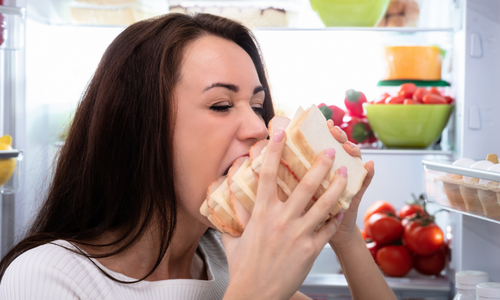What’s Going On In Your Brain?

Issue No. 28 | Brought to you by the Addiction Reset Community – ARC
Unlocking the secrets of processed food addiction and guiding you to find freedom from food and weight obsession.

Have you ever experienced a total loss of control that leads to overeating despite your intention to cut back?
Have you witnessed yourself behaving like a programmed robot, responding to the urge to eat processed foods despite your best efforts to abstain from them?

Or have you found yourself overeating just to cope with stress and manage your emotions, despite not being hungry?
Observing yourself switching to this almost ‘auto-pilot’ mode, where you are seemingly unable to stop yourself from eating the foods you intend to avoid, can be very frightening. It can also lead to self-blame and feelings of frustration or shame. Let’s take a closer look at what’s really going on in your brain.

In previous issues of this newsletter, we have outlined the history of processed food addiction and highlighted the devastating role of big tobacco and big food industries in driving this addiction. Their addiction business model is built with the objective of teaching the brain to crave highly addictive food-like substances. Then to trigger cravings for those foods through ‘Pavlovian conditioning’, using extensive advertising and making those products affordable and widely available, to reach people at the youngest possible age.
If you are amongst the billions of people worldwide who have succumbed to the onslaught of this highly effective addiction business model, then the net result has been that the “braking system” in your brain has been damaged.
In a normal, unaddicted brain, exposure to these toxic foods in your home, workplace or social environment, does not lead to loss of control because the “braking system” located in the brain’s pre-frontal cortex, is working effectively. Pushing away from the table or saying “no thank you” to the foods that you want to abstain from, is easy. In a normal brain, with a functioning frontal lobe “braking system”, you still have the power over your food decisions and control is easy.
In the addicted brain, billions of addicted brain cells make it extremely difficult, if not impossible, to maintain control.
With just the right environmental stimuli, the brain is triggered into a mechanical process of craving. The brain is flooded with neurotransmitters, driving blood flow away from the frontal lobe, to the addicted neuro-pathways, cueing addictive behavior. Inability to manage cueing and a malfunctioning frontal lobe ‘braking system’ cause a loss of decision-making power, resulting in relapse.

This loss of control is NOT your fault! This is a mechanical response in an addicted brain.
The good news is that these addicted brain cells can be retrained. It just takes time and the right approach to recovery. Understanding what’s happening in the brain, developing skills to manage environmental triggers and cues and using a gentle, kind approach that harnesses the brain’s natural desire to conform to those around us, are key to regaining control.
The Addiction Reset Community’s approach to recovery from food addiction is designed to help you retrain billions of addicted brain cells and bring your frontal lobe ‘braking system’ back online.


Within the Addiction Reset Community (ARC) our members and their journeys are important to us. We find their stories inspiring and hopeful for everybody in health recovery.
“In just the first four weeks, my life has changed. I no longer obsess about food, I feel more in control of my eating with each day it's getting better. I’m also noticing that after eating clean for a few weeks, it feels like my anger is subsiding. I find I am not as fixated on negativity. I feel hopeful again and have such gratitude in my life.”

Many people reach out to Joan asking for advice and assistance on how they can begin their recovery journey.
Dear Joan
Do I have to eliminate honey when following a clean food meal plan? I’ve always believed honey to be natural and it’s healthy.
Joan responds:
You never have to give up anything you eat until you feel ready. Research shows that the taste buds activate a dopamine release when any concentrated sweet taste contacts the taste buds on the tongue. So this would include the sweet taste of honey. Over-stimulation of dopamine is not helpful to recovery from processed food addiction.
DISCLAIMER:
Dr Joan Ifland (PhD) is a global expert on the subject of processed food addiction and is not a medical doctor. Information and response shared in this Newsletter are not intended for, and should not be construed as medical advice.

Do you have a question? Reach out to us with your questions about food addiction and recovery at gethelp@foodaddictionreset.com
Are you showing signs of Processed Food Addiction? Take this self-quiz to find out now!
Recent copies of Dr Joan Ifland's Blog:
Issue 01 | Issue 02 | Issue 03 | Issue 04 | Issue 05 | Issue 06 | Issue 07 | Issue 08 | Issue 09 | Issue 10 | Issue 11 | Issue 12 | Issue 13 | Issue 14 | Issue 15 | Issue 16 | Issue 17 | Issue 18 | Issue 19 | Issue 20 | Issue 21 | Issue 22 | Issue 23 | Issue 24 | Issue 25 | Issue 26 | Issue 27

